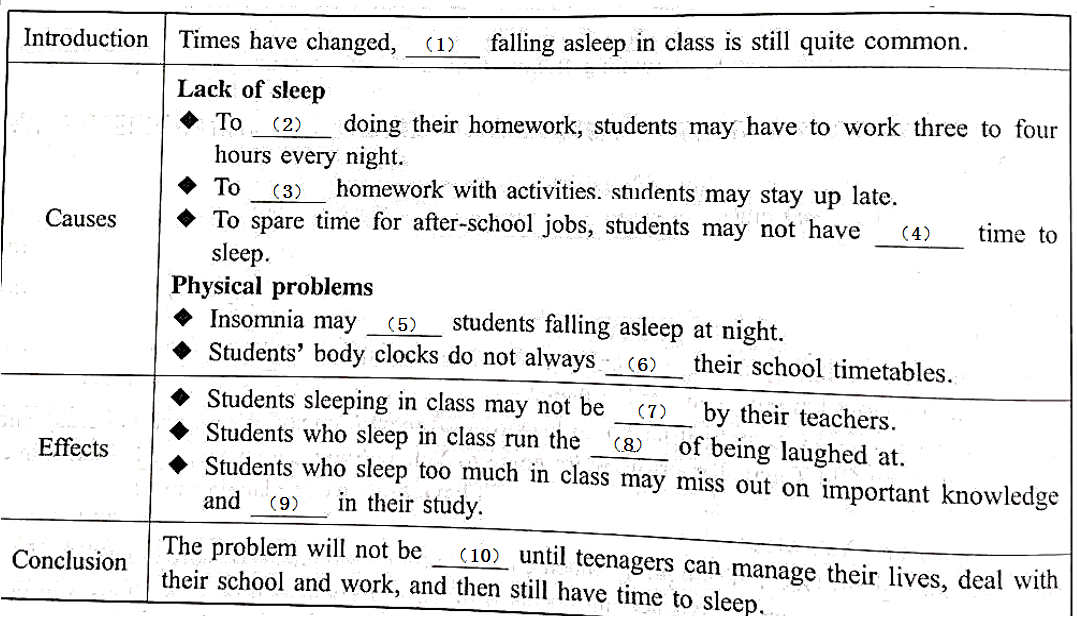题型:配对阅读 题类:真题 难易度:普通
江苏省南京市2019年中考英语试卷

Though times have changed, falling asleep in class is still a common occurrence (常事) among teenagers.
Why do students sometimes fall asleep in class? An obvious reason is lack of sleep. However, there are also causes for getting too little sleep.
Homework is a daily occurrence for most students, one that can take three to four hours per night. A teenager who wants to be able to take part in any activity besides homework must stay up late to fit everything in. Club activities, sports, computer-game playinig, and TV viewing, for example, all contribute to(促成) teens having less time For both homework and sleep. Sometimes teens lack sleep because of after-school jobs that are taken on to earn extra money for college, family expenses, or simply for clothes.
Physical problems are another factor that can cause students to fall asleep in class. For example, insomnia, which may keep a student up at night, causing exhaustion(疲惫不堪的) during class hours, is a serious problem that may require medical attention. Medical evidence also supports the idea that each person has a body clock that helps to decide his or her sleep pattern. Unluckily, these body clocks do not always work according to school timetables.
The effects of falling asleep in class can be quite serious. First of all, sleeping in class is not a good way to endear(使受喜爱) yourself to teachers. In addition, it is highly possible that other students may make jokes about those who sleep in class. However, the most harmful effect of sleeping in class is missing out on important points. In the long run, sleepers may end up failing classes.
Since teens are probably not going to deal with the problem, falling asleep in class will probably remain an all-too common occurrence. It will continue until more teens find a way to balance their personal and social lives with school and work, while still finding enough time to sleep.

something although wrong chance friend hang long quickly you talk |
How can I improve my English? My students have been asking this question. {#blank#}1{#/blank#} the answer won't be proper for everyone, I'm still going to tell you some of my experience. I hope it will help improve {#blank#}2{#/blank#} English learning skills.
One thing is that, once you start learning, you should try to think in English as much as possible. If you see {#blank#}3{#/blank#} when you're walking down the street, just think about "How can I say it in English?" At first, you may think with simple words but later with {#blank#}4{#/blank#} sentences. Now I'm in America, and most of the time, I think in English and speak it directly. It's amazing how much this helps.
When I started learning English, I was often afraid of {#blank#}5{#/blank#} with others in English because I didn't want to make mistakes. Finally, I had a {#blank#}6{#/blank#} to get it over. In America, I tried to {#blank#}7{#/blank#} out with American friends, so that I'd have to speak English. Also, I decided if I said anything {#blank#}8{#/blank#} and other people laughed at me, just let it be. After that, my English started to improve more {#blank#}9{#/blank#}. Besides, it may be a good idea to ask your foreign {#blank#}10{#/blank#} to look at the way you're writing. They can give you some advice for improvement.
试题篮